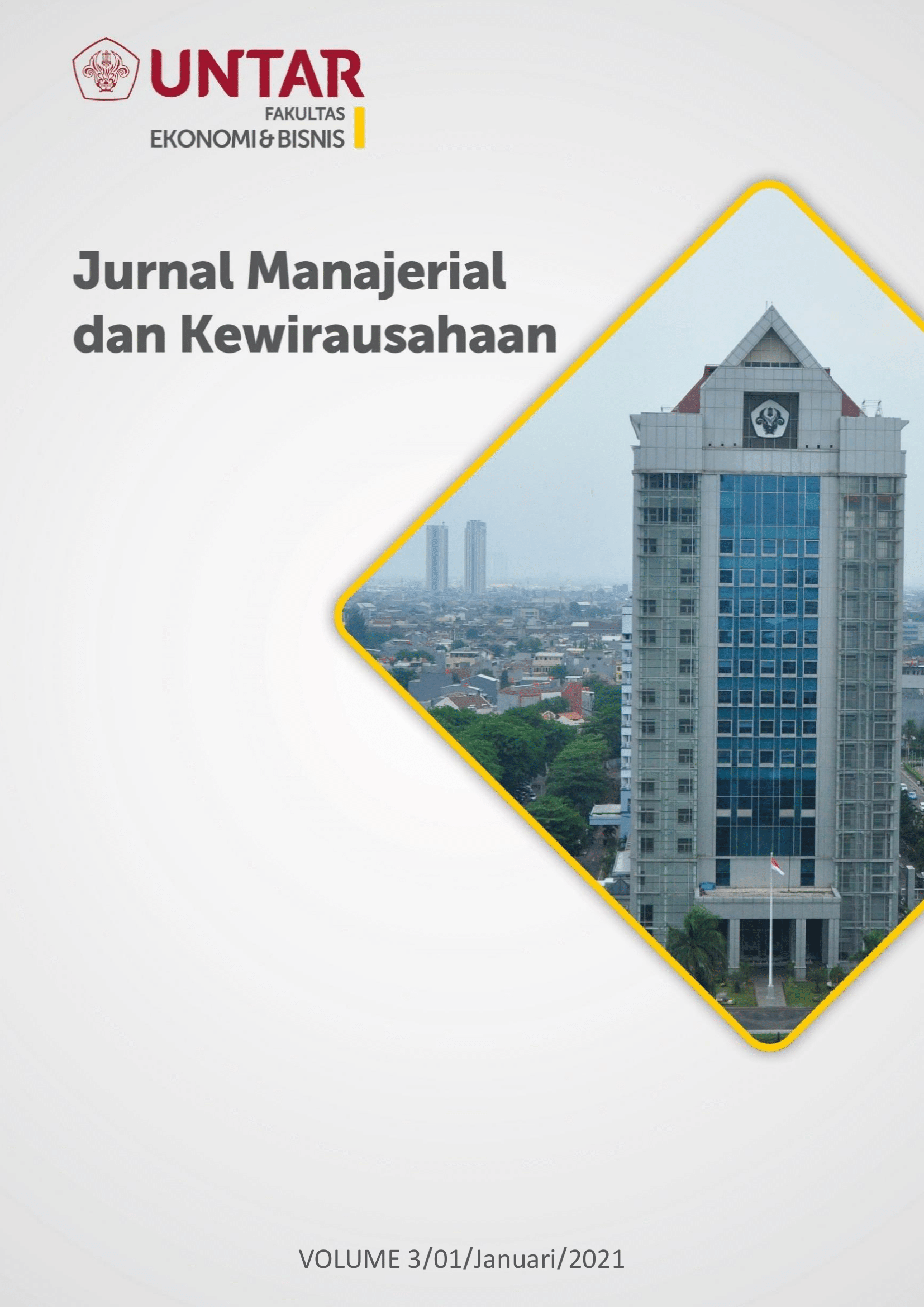Pengaruh Pendidikan Kewirausahaan Dan Efikasi Diri Terhadap Intensi Wirausaha Mahasiswa Universitas Tarumanagara
Main Article Content
Abstract
The purpose of this research is to empirically examine the relationship between Entrepreneurship Education and Self-Efficacy towards Entrepreneurial Intention of Students Universitas Tarumanagara. The population of this research is 150 respondents of Students on Faculty of Economics and Business, Universitas Tarumanagara. Data are collected by using Google Form questionnaire then processed by using SmartPLS-SEM program. The method used in this research was non probability sampling with judgemental sampling tecnhnique. The results of this research are Entrepreneurship Education has a significant effect on Entreprenurial Intention. Self Efficacy has a significant effect on Entrepreneurial Intention.
Tujuan dari penelitian ini adalah untuk menguji secara empiris hubungan pendidikan kewirausahaan dan efikasi diri terhadap intensi wirausaha Mahasiswa Universitas Tarumanaga. Populasi dari penelitian ini sebesar 150 responden yang merupakan Mahasiswa/I Fakultas Ekonomi dan Bisnis Universitas Tarumangara. Teknik penggumpulan data dilakukan dengan penyebaran kuisioner melalui Google Form dan kemudian diolah menggunakan program SmartPLS-SEM. Metode pengambilan sampel yang digunakan dalam penelitian ini adalah non probability sampling dengan teknik judgemental sampling. Hasil dari penelitian ini menunjukkan bahwa pendidikan kewirausahaan berpengaruh signifikan terhadap intensi wirausaha. Efikasi diri berpengaruh signifikan terhadap intensi wirausaha.
Article Details
Section
This work is licensed under a Jurnal Muara Ilmu Ekonomi dan Bisnis Creative Commons Attribution-ShareAlike 4.0 International License.,/p>
References
Ajzen, I. (1991). “The theory of planned behavior. Organizational Behavior and Human Decision Processes” 50(2), 179-211.
Badan Pusat Statistik. (2020) Februari 2020 Tingkat Pengangguran Terbuka (TPT) sebesar 4,99 persen (Retrieved From: www.bps.go.id / 9-11-2020)
Bandura, A. (1997). Self-Efficacy, the Exercise of Control. New York: W.H. Freeman and company.
Chang, J., & Rieple, A. (2013). Assessing students. entrepreneurial skills development in live projects. J Small Bus Enterp Dev, 20(1), 225-241. Cromie, S., (2000) “Assessing entrepreneurial inclinations: some approaches and empirical evidence.” European Journal of Work and Organizational Psychology, 9(1), 7-30.
Ediagbonya, K. (2013) “The roles of entrepreneurship education in ensuring economic empowerment and development.” Journal of Business Administration and Education, 4(1), 35-46.
Fayolle, A., & Gailly, B. (2015) “The impact of entrepreneurship education on entrepreneurial attitudes and intention: hysteresis and persistence.” J Small Bus Manag, 53(1), 75-93.
Frank, H., Korunka, C., Lueger, M., & Mugler, J. (2005) “Entrepreneurial orientation and education in Austrian secondary schools.” Journal of Small Business and Enterprise Development, 12(2), 259-273.
Gerba. D. T., (2012). “Impact of entrepreneurship education on entrepreneurial intentions of business and engineering students in Ethiopia.” African Journal of Economic and Management Studies, 3(2), 258-277.
Gorman, G., Hanlon, D. & King, W. (1997) “Some research perspectives on entrepreneurship education, enterprise education and education for smallbusiness management: a ten-year literature review.” International Small Business Journal, 15(3), 56-77.
Hair Jr, J. F., Sarstedt, M., Hopkins, L., & Kuppelwieser, V. G. (2014) “Partial Least Squares Structural Equation Modeling (PLS-SEM): an emerging tool in business research.” European Business Review, 26(2), 106-121.
Hidayati, N. (2015). “Faktor-Faktor Yang Berpengaruh Terhadap Keputusan Berwirausaha dan Dampaknya Terhadap Kualitas Hidup (Studi Terhadap Wanita Wirausaha Kuliner di Jawa Tengah)” Jurnal pendidikan, 3(1), 7-13.
Kasmir. (2011). Kewirausahaan. Jakarta: PT. Raja Grafindo Persada. M, Khumaedi. (2012) “Reliabilitas Instrumen Penelitian Pendidikan.” Jurnal Pendidikan Teknik Mesin, 12(1), 25-30.
Ormrod, J., E. (2008). Psikologi Pendidikan (membantu siswa tumbuh dan berkembang jilid 2). Jakarta: Erlangga. Patricia & Kusumajanto (2018) “Effect of Entrepreneurship Education and Self Efficacy Towards The Intention of Entrepreneurship.” Jurnal Pendidikan Bisnis dan Manajemen, 4(3), 128-133.
Retno, B. L., & Trisnandi, W. (2012) “Pengaruh Pendidikan Kewirausahaan Terhadap Minat Berwirausaha Mahasiswa di STIE MDP, STMIK MDP, dan STIE MUSI.” Jurnal Ilmiah STIE MDP, 1(2), 112-119.
Shane, S., Locke, E.A. and Collins, C.J. (2003), “Entrepreneurial motivation”. Human Resource Management Review,” 13 (2), 257-279.
Suharti, L., & Sirine, H. (2011). “Faktor-faktor yang Mempengaruhi Terhadap Niat Kewirausahaan (Studi terhadap mahasiswa Universitas Kristen Satya Wacana, Salatiga).” Jurnal Manajemen Dan Kewirausahaan, 13(2), 124–125.
Soumyaja, D., & Alexander, L. (2016) “A study on the influence of personality traits on entrepreneurial intention among working professionals in the Indian technical organizations.” Pac Bus Rev Int, 9(5), 12-19.
Tenenhaus M, Vinzi VE, Chatelin YM, Lauro C (2005) “PLS path modeling.” Comput Stat Data Anal, 48(1), 159–205.
Wijaya, T (2008) “Kajian Model Empiris Perilaku Berwirausaha UKM DIY dan Jawa tengah”. Jurnal manajemen dan Kewirausahaan, 10(2), 93-104.
Zulfa, I., (2015) “Pengaruh Implementasi Internal Marketing Terhadap Kinerja Melalui Kepuasan Tenaga Kependidikan Di Fakultas Ekonomi Dan Bisnis Universitas Brawijaya Malang.” Jurnal Ilmiah Administrasi Publik (JIAP), 1(2), 59-69.
Zahra, P. (2017) “Pengaruh Efikasi Diri dan Pengetahuan Manajemn Keuangan Bisnis Terhadap Intensi Berwirausaha.” Jurnal Wira Ekonomi Mikroskil, 7(2), 141-150.
Zhao, H., Seibert, S. E., & Hills, G. E. (2005) “The Mediating Role of SelfEfficacy ini the Development of Entrepreneurial Intentions.” Journal of Applied Psychology, 90(6), 1265- 1272.

